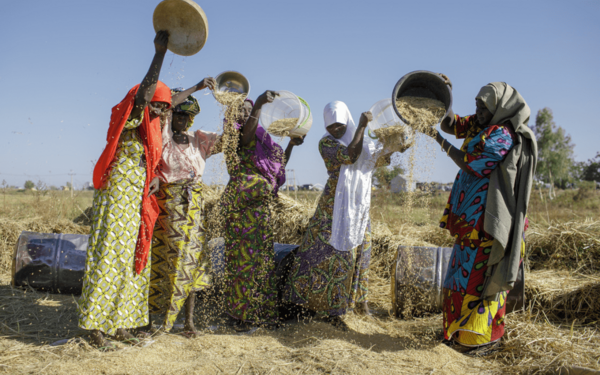20 years of the right to food - what has been achieved?
Food is a fundamental right for all people. More than 170 countries have committed to realising this right by joining the UN Covenant on Economic, Social and Cultural Rights. However, the reality is quite different: 733 million people are suffering from hunger worldwide. To mark the 20th anniversary of the FAO's Voluntary Guidelines on the Right to Food, the spotlight is on global progress and ongoing challenges of securing this fundamental human right. What has already been achieved? And what is the agenda for the future?
What does it take to turn the political goals of the right to food into reality? Dr. Andreas Schaumayer (German Federal Ministry for Economoc Cooperation and Development), Bernd Schwab (German Federal Ministry of Food and Agriculture) and Michael Windfuhr (German Institute for Human Rights) discuss this in an interview. At the 52nd session of the United Nations Committee on World Food Security (CFS), participants agreed on new measures to reduce inequalities in food policy, as CFS Chairwoman Nosipho Jezile reports. Mary Karanu from the Right to Food Coalition Kenya demonstrates how a strong civil society can actively combat hunger and food insecurity. Additionally, a Welthungerhilfe position paper summarises possible courses of action to realise the right to food.
"The world faces urgent challenges; we must unite for food security. Over 700 million people still suffer from hunger. It's time for coordinated action to ensure nutritious food for all and achieve our SDG's."
- Maximo Torero, Chief Economist of the FAO, at the 52nd session of the Committee on World Food Security.
KEY STEPS FOR FOOD SECURITY
Originally adopted in 2004, these guidelines have helped countries integrate the right to food into national policies and legal frameworks. Global representatives have reached consensus on the Voluntary Guidelines for the Right to Food, setting key measures to ensure food security and nutrition for all.
More than a third of the world's population cannot afford a healthy diet.
A healthy diet for all requires diversity in our fields, in our fishing nets, in our markets and on our tables. This is because a healthy diet not only requires sufficient food, but also a balanced composition. Yet more than a third of the world's population cannot afford a healthy diet. Climate change, increasing inequality, conflicts and the consequences of the COVID-19 pandemic are exacerbating an already critical situation.

How can the right to food be realised?
The right to food is a fundamental human right. More than 170 countries have committed to realising this right by joining the UN Covenant on Economic, Social and Cultural Rights. But how can the right to food be achieved?
Similar Artciles on Food4Transformation
How can EU agriculture contribute to combating hunger and climate change without causing conflicts for global food security? Why are the right to food, inclusivity, agroecology, and food sovereignty key levers for a successful transformation and what approaches are being pursued to tackle food insecurity and global challenges? Find answers to these questions in the following related articles.

How food and agriculture can help reach climate and sustainability goals
Agriculture and food systems can make an important contribution towards European and global climate and sustainability goals. The necessary measures will need to be designed carefully to maximise synergies between emissions reductions, biodiversity protection and food security. These involve substantial changes for agriculture and food production in the EU, which – depending on how they are designed – could bring about synergies but also conflicts with the goal of global food security.

The right to nutrition: how we can realise it
Stefan Schmitz is the Executive Director of the Global Crop Diversity Trust. He was the Commissioner for the One World - No Hunger Initiative (SEWOH) at the BMZ until 2019. This role enables him to see the SEWOH from a different perspective. We asked him, as someone who works in a multilateral organization, which aspects of the SEWOH he considers groundbreaking in terms of advancing global goals like the achievement of the United Nations Sustainable Development Goal 2 (SDG 2) at a national and global level.

The goals of transformation should leave no one behind
Areike Haase and Stig Tanzmann from Brot für die Welt explain why the right to food, inclusivity, agroecology, and food sovereignty are essential levers for transforming food systems. Through inclusive, human-centered solutions, they aim to build a fair, climate-resilient food system that benefits all.



